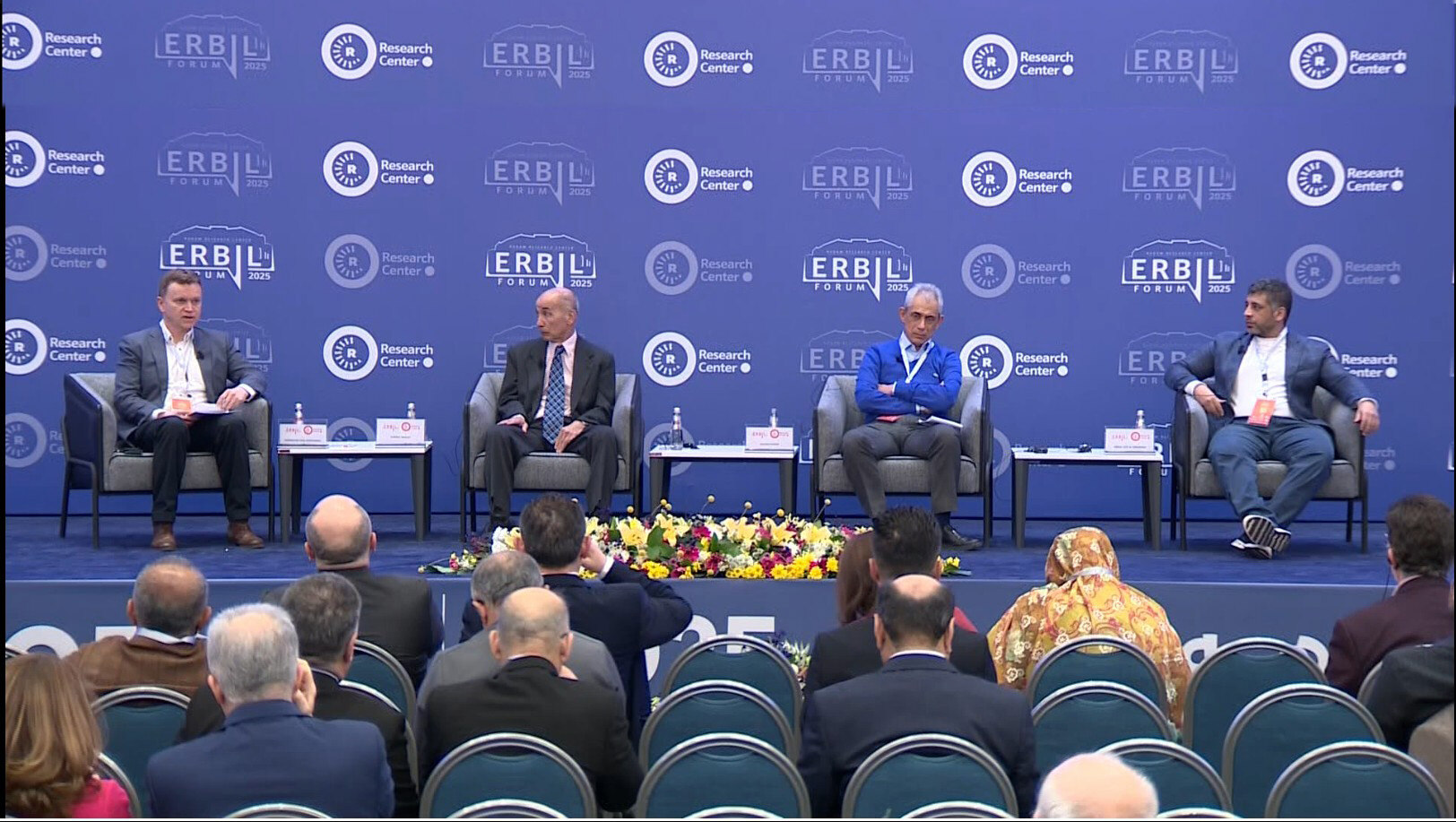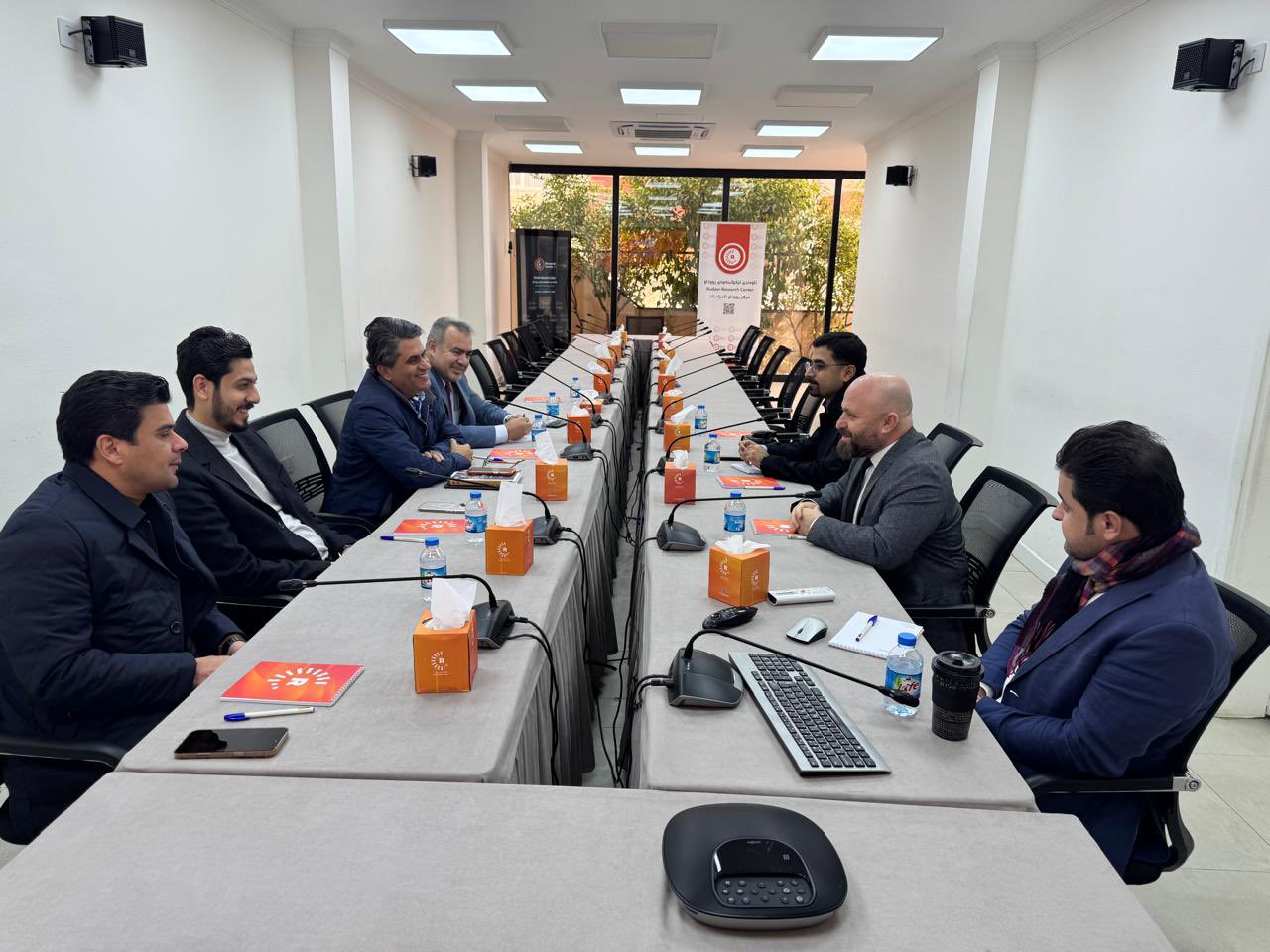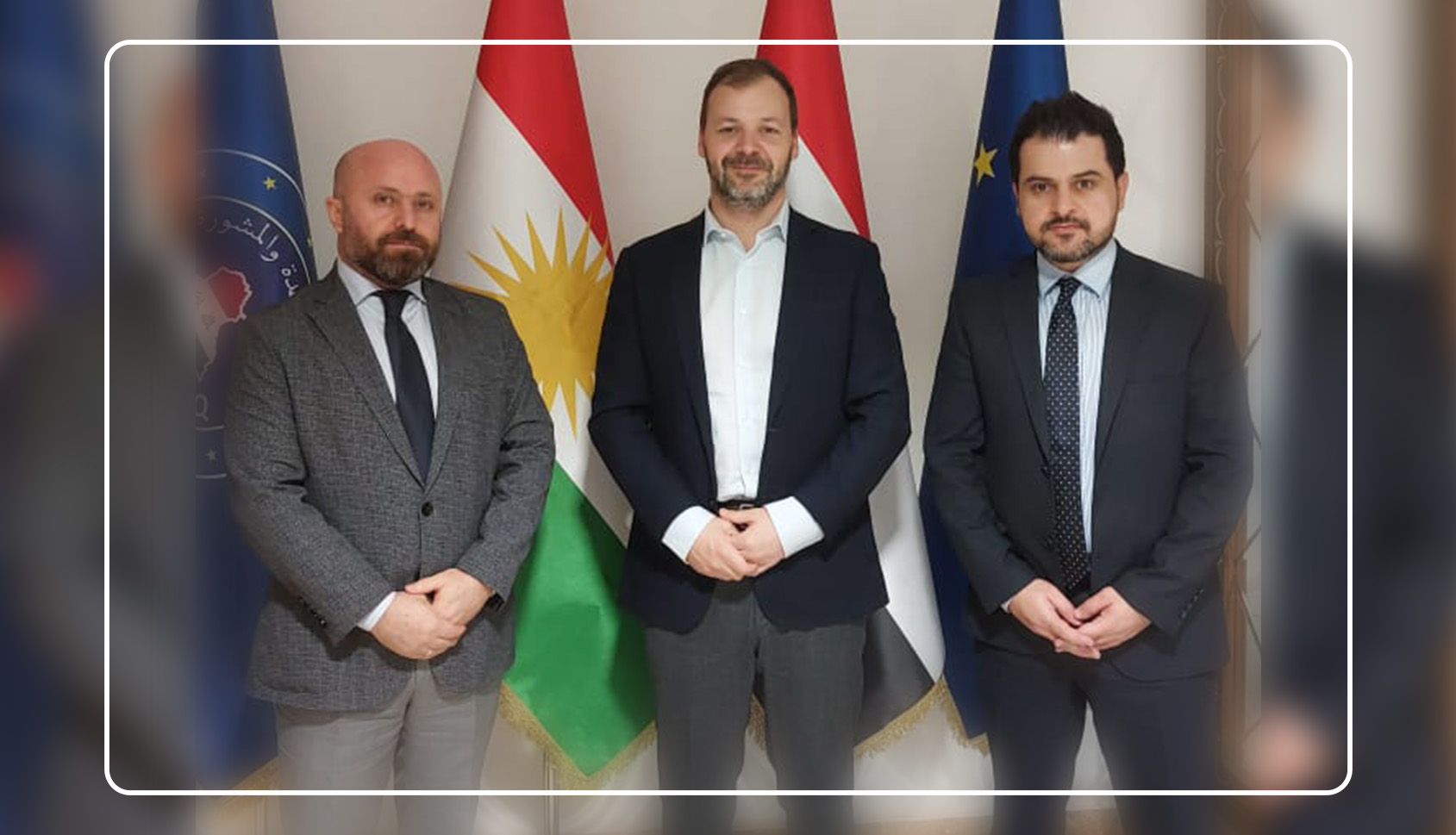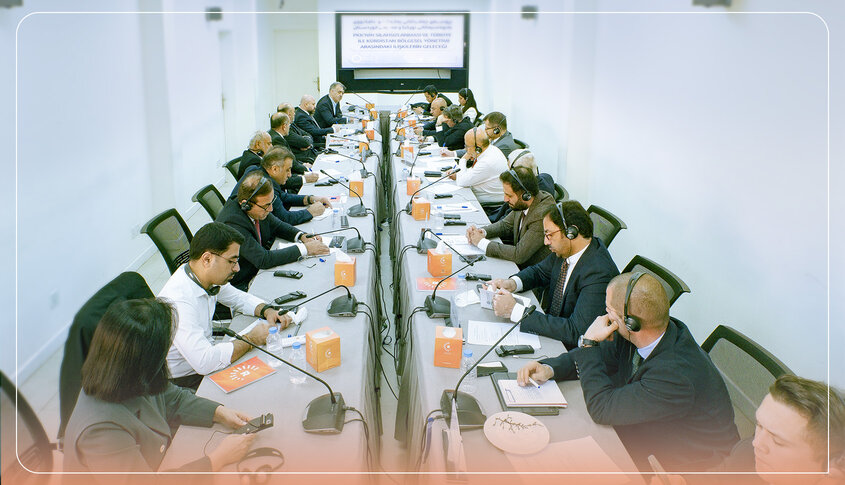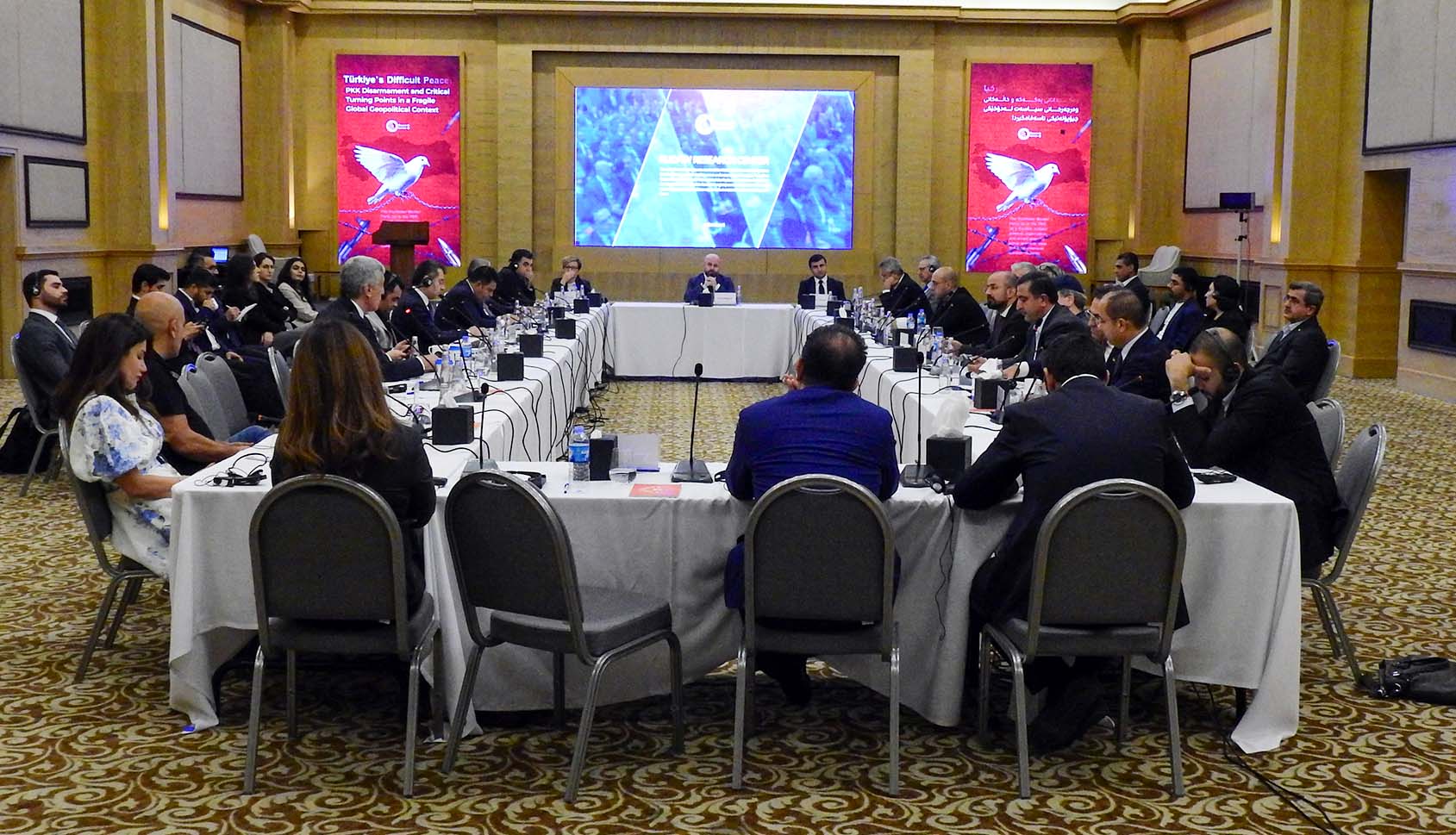Paul Dziatkowiec:
Good morning, everyone, and welcome to the second session, which naturally follows the discussion we just had on water security. This session will focus on climate change and geopolitical challenges in the Middle East.
My name is Paul Dziatkowiec, and I am the Director of Mediation and Peace Support at the Geneva Centre for Security Policy, one of the partners of this year’s Erbil Forum. I am very pleased to be partnering with Rudaw to help organize this prestigious event.
I am joined today by three prominent experts on these issues, whom I will introduce in a moment. Unfortunately, one of our panelists could not be with us, but I do have some of his remarks to share later in the session.
I am very pleased to introduce our speakers:
- Professor Gawdat Bahgat, Professor of National Security Affairs at the Near East South Asia Center for Strategic Studies, National Defense University, Washington, D.C.
- Dr. Abdulaziz Al-Ghashian, Senior Researcher and Research Director for the Middle East at the Observer Research Foundation.
- Mr. Hassan Partow, Program Manager at the Post-Conflict and Disaster Management Branch of the United Nations Environment Programme.
Thank you all very much for joining us.
This session will address two interconnected issues that are central to security in the Middle East: climate change and geopolitical turbulence. The Middle East is one of the most vulnerable regions in the world to the effects of climate change, and also one of the most conflict-prone. Any discussion about achieving a secure and prosperous Middle East must address both the geopolitical and environmental challenges facing the region—while also understanding and leveraging the interplay between them.
There is a clear need to develop diplomatic and peacemaking tools that are better suited to addressing these risks simultaneously. These challenges are inherently cross-border in nature, and thus require interstate collaboration, as well as joint strategies and solutions.
Our objectives for this session are to explore the connections between geopolitics, conflict, and the environment. We will also offer a prognosis on how these factors are likely to interact and shape the future of the region. Finally, we hope to generate ideas on how security and environmental threats can be mitigated or prevented through interstate cooperation and regional integration.
With all that in mind, I’d like to begin by turning to Professor Gawdat Bahgat. Professor, I think everyone here is eager to hear your perspective on the new U.S. administration and its foreign policy direction. As someone based in Washington, D.C., I must ask: given what you’ve observed over the past few weeks, what kind of approach can we expect from the new leadership in Washington regarding Middle East security and energy security? Specifically, what are your thoughts on how the administration might address conflict prevention, diplomatic tension, and broader security concerns in the region?
Gawdat:
Thank you, Paul. Before I say anything, I must emphasize that whatever I say represents only my personal opinion and does not reflect the official policy of the United States government or the Department of Defense. This is a very special time in Washington. The Trump administration is unique, at least for two reasons. First, President Trump is only the second president in United States history to lose an election and then get reelected. The only other time this happened was more than 130 years ago in 1888, making it a rare occurrence in American politics. The second reason is that the U.S. system is built on a system of checks and balances. Most of the time, the White House is controlled by one party, while Congress is controlled by the other. This structure ensures a balance of power. However, what we have now in Washington is different: one political party, the Republican Party, controls both the White House and Congress. As a result, President Trump has good reason to feel that he has a mandate, and he does not hesitate to use that mandate. This is why the Trump administration is almost unique in American policy.
When it comes to the Middle East, it is important to note that the region does not simply react to changes in Washington, D.C.; the Middle East takes the initiative as well. There has been a significant geopolitical shift in the region. A few years ago, especially before October 7th, many Middle Eastern countries were very concerned about Iran. I have heard repeatedly that Iran was accused of controlling four Arab countries: Syria, Iraq, Lebanon, and Yemen. I believe this accusation was greatly exaggerated. What happened after October 7th was a change in the balance of power. To a large extent, Israel has emerged as the dominant military power in the region, which has led to a shift in policy. Arab countries and Turkey are now more concerned about Israel and less concerned about Iran. This is why the Iranian president met with the Egyptian president, and the Jordanian foreign minister visited Tehran. Turkey, too, has made statements, with President Erdogan warning that Israel may attack Turkey. There has been a noticeable shift in the region, and most regional powers now perceive Israel, rather than Iran, as the primary threat.
So, what does this mean for Israel and the future of the region? First, international policy is never a zero-sum game. There are always win-win situations. Second, in the Middle East, Arabs, Turks, Iranians, Israelis, Kurds, and other communities have lived side by side for thousands of years, and they will continue to do so. They must learn to coexist peacefully. The challenge now is that Israel will never be secure unless it is accepted by its neighbors. The current Israeli government is the most extreme in the country's history, and Israel will not be able to impose its will on its neighbors. A two-state solution is essential, and there must be a political compromise with the Palestinians and with the Arab world. Iran and Turkey, as major regional powers, are accepted by their neighbors. The way forward, therefore, is for all parties—Arabs, Turks, Iranians, Israelis, Kurds, and others—to accept each other. The United States, as a major global power, works with other countries, including Russia and China. As I mentioned earlier, international policy is not a zero-sum game. I am glad that we have representatives from Russia and China here today, as this is good for peace in the region. Thank you.
Gawdat Bahgat:
Thank you, Paul. Before I begin, I must emphasize that anything I say represents my personal opinion and does not reflect the official policy of the United States government or the Department of Defense.
This is a very unique time in Washington. The Trump administration is exceptional, at least for two reasons. First, President Trump is only the second president in U.S. history to lose an election and then get re-elected. The only other time this occurred was more than 130 years ago, in 1888, making it a rare event in American politics. The second reason is that the U.S. political system is based on checks and balances. Typically, the White House is controlled by one party while Congress is controlled by the other. This system ensures a balance of power. However, what we have now in Washington is different: one political party, the Republican Party, controls both the White House and Congress. As a result, President Trump has good reason to feel he has a mandate, and he does not hesitate to use that mandate. This is why the Trump administration is almost unprecedented in American policy.
When it comes to the Middle East, it is important to note that the region does not simply react to changes in Washington, D.C.; the Middle East takes the initiative as well. There has been a significant geopolitical shift in the region. A few years ago, especially before October 7th, many Middle Eastern countries were very concerned about Iran. I have heard repeatedly that Iran was accused of controlling four Arab countries: Syria, Iraq, Lebanon, and Yemen. I believe this accusation was greatly exaggerated. What happened after October 7th was a change in the balance of power. To a large extent, Israel has emerged as the dominant military power in the region, leading to a shift in policy. Arab countries and Turkey are now more concerned about Israel and less concerned about Iran. This is why the Iranian president met with the Egyptian president, and the Jordanian foreign minister visited Tehran. Turkey, too, has made statements, with President Erdoğan warning that Israel may attack Turkey. There has been a noticeable shift in the region, and most regional powers now perceive Israel, rather than Iran, as the primary threat.
So, what does this mean for Israel and the future of the region? First, international policy is never a zero-sum game. There are always win-win situations. Second, in the Middle East, Arabs, Turks, Iranians, Israelis, Kurds, and other communities have lived side by side for thousands of years, and they will continue to do so. They must learn to coexist peacefully.
The challenge now is that Israel will never be secure unless it is accepted by its neighbors. The current Israeli government is the most extreme in the country’s history, and Israel will not be able to impose its will on its neighbors. A two-state solution is essential, and there must be a political compromise with the Palestinians and with the Arab world. Iran and Turkey, as major regional powers, are accepted by their neighbors.
The way forward, therefore, is for all parties—Arabs, Turks, Iranians, Israelis, Kurds, and others—to accept each other. The United States, as a major global power, works with other countries, including Russia and China. As I mentioned earlier, international policy is not a zero-sum game. I am glad that we have representatives from Russia and China here today, as this is good for peace in the region.
Thank you.
Paul:
Thank you so much, Professor, for helping to set the stage for our discussion. You spoke about the shifting balance of power in the region, with increasing concern about Israel and perhaps less concern about Iran than we have been accustomed to in recent years. You also provided valuable insight into the U.S. perspective, noting that the return of a president with a very powerful position and an almost unprecedentedly strong mandate marks a unique and significant time in Washington. As you mentioned, this means we are still unclear about what all of this will ultimately mean, but we are all watching closely to see how it plays out, especially in the context of the Middle East.
I will now turn to Dr. Abdulaziz Alghashian, who has joined us from Saudi Arabia. Dr. Alghashian, Saudi Arabia plays a key role in regional security, and therefore, potentially also in environmental security. What is the strategic vision in Riyadh when it comes to long-term security in the Middle East? And to what extent does that vision take into account the environmental challenges faced by the region?
Dr. Abdulaziz Alghashian:
Firstly, I would like to express my gratitude for the invitation and thank the organizers for facilitating this event. It’s a great pleasure to join all of you. I would like to add a few words to set the context. When we look at the region today, there are significant areas in need of reconstruction. As the previous speaker astutely mentioned, Gaza is still embroiled in conflict, and many are pessimistic about the prospects for peace. Similarly, Syria is another region that requires extensive reconstruction, along with Lebanon and Yemen.
From Riyadh’s perspective, the situation suggests that there will be a substantial need for regional reconstruction. However, Saudi Arabia is also undergoing its own economic reconstruction. This raises important questions about how Saudi Arabia can contribute to the wider regional reconstruction, especially while it focuses on restructuring its own economy to become more diverse. How can these processes align?
I believe we are at a critical juncture where we must start considering a new form of diplomacy emerging in the region—reconstruction diplomacy. How can regional interests, which are essential for Saudi Arabia, align with its national needs? A stable Saudi Arabia is crucial for regional stability, and without it, the ambitious goals that Saudi Arabia has set for itself will remain unachievable. This leads to several challenging questions, with one key question being how the private sector can play a role in addressing these issues. How can we establish a regional vision and framework that addresses the critical aspects of reconstruction?
Perhaps the guiding principle here should be integration. The idea of greater regional integration and finding mechanisms to facilitate enhanced collaboration and cooperation seems to be a sustainable way forward. This approach could not only address security concerns but also help prevent the cyclical conflicts we are currently witnessing. For Saudi Arabia and other countries in the GCC, the current situation is simply unsustainable. There is a growing desire for a regional agency capable of addressing not just economic and geopolitical issues, but also environmental concerns.
At this stage, we can no longer separate these issues. They are all interconnected and reflect the trajectory the region is heading toward, one marked by increasing interconnectivity. Spillover effects are inevitable, but perhaps the concept of spillover effects could also serve as a tool to create space for cooperation. By focusing on environmental or economic issues, we can generate jobs and opportunities that keep stakeholders engaged and invested.
This brings us back to the necessity of the right discourse moving forward. How can we incentivize and engage key stakeholders—whether from Saudi Arabia, Europe, or even the new U.S. administration? It’s essential to invest in specific strategies that create win-win scenarios. An integrated and interconnected region, supported by a regional agency, represents a long-term investment in security—not just in geopolitical security, but also in environmental security, addressing all these issues simultaneously.
Paul:
Thank you so much, Dr. Al-Ghashian, for that important perspective from Saudi Arabia, which is working through its own economic reconstruction. I appreciated you introducing the idea of reconstruction diplomacy as a means of promoting regional integration and economic connectivity, while also highlighting the stronger roles that can be played by other actors—not just governments but also the private sector. This is not only in the realm of economic connectivity but also in areas such as environmental security.
Thank you for sharing that view from Riyadh. Now, we’ll pass over to Mr. Hassan Partow. Hassan, you bring vast experience in post-conflict environmental assessments and environmental recovery programs all over the world, including in this region of the Middle East. Based on your work, what would you say are the main opportunities and constraints in forging a more cooperative interstate approach to dealing with the environmental impacts of conflict?
Hassan Partow:
Thank you, Paul, and good morning, everyone. Over my 20 years of experience working on environmental damage and harm caused by conflicts, one thing that stands out clearly is that most countries recognize protecting the environment from the harm caused by conflicts as one of the main areas of potential cooperation.
When we, at the UN Environment Programme (UNEP), started working on the environmental aspects of conflicts, the initial request came from regional countries. The first benchmark case was the Gulf War in 1991, when over 600 oil wells were set alight, creating all kinds of issues around transboundary pollution and spills into the Gulf. UNEP’s more systematic engagement in this area began after the Kosovo conflict in the Balkans when the riparian countries of the Danube Basin were concerned about the pollution from military strikes against industrial facilities in Serbia. So, it was always the regional countries that placed environmental aspects as a prominent issue in international forums.
This recognition of environmental damage has become a key incentive for getting member countries engaged in diplomacy to find solutions to these issues. It involves data sharing, knowledge sharing, expertise sharing, and environmental solutions and technologies to address issues such as water scarcity, pollution, contamination, waste management, and renewable energy. Leveraging data and science serves as a neutral language and creates a catalytic space for different actors to engage, build confidence, and form connections between experts from various countries on these issues.
In this region, as I have observed in the projects we’ve worked on, there is now a hub of environmental knowledge, including cutting-edge technologies related to renewables and desalination, particularly in the Gulf region. Countries like Saudi Arabia and the United Arab Emirates have strongly embraced this narrative, with numerous initiatives underway. For example, Saudi Arabia’s Green Middle East Initiative aims to plant around 50 billion trees and foster a greener vision for the region.
Leveraging the financial resources and expertise available in the Gulf, which includes many individuals from the Mashreq region who have relocated from countries like Sudan, Egypt, and Iraq, is a significant advantage. These connections are already well-established. One major benefit of this cooperation is the common Arabic language, which has made a substantial difference in how collaboration progresses. Many of the experts from Iraq, who have experienced multiple conflicts, have also built their expertise and can share this knowledge in reconstruction efforts, such as those in Gaza, Syria, and other conflict-affected areas.
Let me provide a specific example: many current conflicts are taking place in urban areas. In Gaza, for instance, vast amounts of debris and rubble have been created—around 50 billion tons. Iraq faced a similar issue, with about 55 billion tons of rubble generated by the ISIL conflict. There is now a wealth of expertise in recycling this rubble and finding ways to reuse it in the reconstruction process itself.
I strongly agree that these solutions and technologies could contribute to the reconstruction diplomacy that was just mentioned. There are also scalable business models and public-private partnerships that can support these efforts.
However, there are constraints. From what I have observed, one of the main issues is red tape. Bureaucratic complexity significantly slows down responses and creates barriers between countries. Even simple issues, such as visa clearances, can be a hindrance. For example, in the EU, there are standby capacities with rosters of experts. When there is an environmental emergency or environmental damage, they can quickly mobilize and deploy their expertise on the ground. There are also safety protocols in place to ensure that the countries deploying experts can manage and provide that expertise effectively.
Another important constraint is the existence of “void spaces” on the map. These are areas without recognized states or authorities, but they still have environmental issues that transcend borders. One example is northeastern Syria, but also places like Sudan and Yemen. We must explore ways to engage non-state actors and de facto authorities in resolving environmental problems in these regions.
Paul:
Thank you so much, Hassan Partow, for these important reflections, particularly for reminding us that post-conflict scenarios are not only grave challenges but also opportunities for promoting regional cooperation. There are many areas for win-win cooperation, including data sharing and technical exchanges, that can help build confidence between countries. This logic has fostered a hub of innovation and state-of-the-art knowledge in the region. The challenge, of course, is to better leverage this knowledge and innovation for the benefit of the whole region.
So, that’s from our panelists so far. We did have a fourth panelist who, unfortunately, couldn’t join us due to a family emergency: Dr. Jawad Al-Kharraz. However, I did ask him to send a few points, which I’ll quickly cover in one minute before we open up to questions from the floor.
Dr. Al-Kharraz’s main point, in answering my question about what inspiration we can draw from elsewhere in the world for examples of partnerships on environmental issues that have helped promote peace, trust, and confidence between countries, was that environmental challenges, as Hassan just mentioned, when approached collaboratively, can become powerful catalysts for peace and stability.
One example he shared is the Blue Peace Initiative, which promotes creative and innovative ways to improve the use of cross-border water as a peace-building instrument by facilitating collaboration between governments, non-governmental organizations, authorities, the private sector, research institutions, and young people. The Blue Peace Middle East Initiative works to transform water from a source of crisis into a catalyst for socio-economic development, cooperation, and peace in the region. It has become the first regionally owned water cooperation mechanism in the modern history of the Middle East.
Another example is the Nile Basin Initiative in East Africa, which brought together ten riparian countries—often facing historical tensions, such as Egypt, Sudan, and Ethiopia—to cooperatively manage the Nile River’s resources. Through technical cooperation, data sharing, and joint infrastructure projects, the Nile Basin Initiative has fostered dialogue, even amid disputes over the Grand Ethiopian Renaissance Dam. What’s instructive here is the focus on mutual benefits, such as hydropower generation and flood control, which create interdependencies and encourage countries to prioritize negotiation over conflict.
He also mentioned the European Union’s Energy Union, particularly its cross-border renewable energy projects. Countries like Germany and Denmark have integrated their wind and solar grids, supported by the EU’s legal and financial frameworks, to optimize energy security and reduce carbon footprints. This model demonstrates how energy diplomacy through joint investment and infrastructure can build trust and economic ties.
Another example was the Mekong River Commission, involving Cambodia, Laos, Thailand, and Vietnam, which shows how regular data exchange and joint environmental monitoring can mitigate tensions over hydropower development. In the Middle East, Dr. Al-Kharraz argued that technical cooperation is a low-risk entry point for building trust. Whether it’s sharing solar yield data or coordinating desalination innovations, starting with practical, apolitical steps can help build confidence.
His second point is that institutions matter. Just like the Mekong River Commission and the Blue Peace Initiative, working through a regional body can help formalize cooperation. His third point is that interdependencies drive peace. For example, when Jordan exports solar power to Lebanon or Saudi Arabia, or when Saudi Arabia invests in Iraq’s green hydrogen sector, mutual reliance reduces the incentive for conflict. This, he argues, is the basic logic of how environmental diplomacy—whether it’s water diplomacy or energy diplomacy—can turn shared vulnerabilities into shared strengths. I believe that’s the main message coming from our speakers.
Question:
You spoke about the general concern regarding the two-state solution. Are you confident that the two-state solution will happen under the Trump administration? And do you think an independent Palestinian state is possible?
Gawdat Bahgat:
Thank you. Two points regarding President Trump’s policy: First, he is very transactional. As my colleagues mentioned, this likely marks a shift from geopolitics to geoeconomics. President Trump famously stated that he would visit Saudi Arabia if the country invested $600 billion. For him, it’s all about economics and money.
I believe there is room for optimism—not only regarding the two-state solution but also for a potential deal between the United States and Iran. Iran is rich in oil and gas, and the United States is, of course, very interested in that. The bottom line for Iran is that it does not seek regime change, and Iran has consistently stated that it is not interested in developing nuclear weapons. They’ve made it clear that nuclear weapons are not part of their defense doctrine. So, I believe there is potential for a deal. President Trump wants to win the Nobel Peace Prize, and a deal with Iran could very well help him achieve that.
Another point about President Trump is that he is highly unpredictable and untraditional. He was the first U.S. president to make his first foreign trip to Saudi Arabia during his first term. Therefore, I would not rule out a deal between the United States and Iran.
Regarding the two-state solution, I think it’s less likely. Just last night, President Trump released a new AI-generated video showing him and Prime Minister Netanyahu enjoying the beach in Gaza. I’m very doubtful that a two-state solution will be reached, though I hope I am wrong. Thank you.
Paul: Dr. Al-Ghashian, would you like to add something?
Dr. Abdulaziz Al-Ghashian:
I just want to add a few words to this. As unlikely as it may seem, we have no other option. This is the reality. In my own work, I have focused on Saudi policy towards Israel for the past 13 years. Recently, my research has centered on how to leverage Saudi Arabia's potential role in Israeli normalization within the peace process. Over the years, I have built many relationships in Israel, and we discuss this idea frequently. The question arises: Is it worth discussing a one-state reality? But the reality is that there is no one-state solution. I cannot hear you, but that’s the truth. We must remain invested in trying to create some form of political horizon within the context of a two-state solution. This will not only allow these two peoples to live side by side but also, from a regional security perspective, we must consider the implications of not having a two-state solution. Otherwise, we risk further spillover effects and instability in the region. It is our responsibility, in this region, to push very strongly for some form of resolution because there is no other option. If we fail, we will face more cyclical conflicts that will spill over into the region, and the region will remain stagnant.
Paul: Thank you. There was a question from the man in the light blue shirt.
Question: Thank you very much for giving me the opportunity to ask questions. I am Ibrahim Mottaghi, a professor at Tehran University. I would like to say that I have learned a lot from this panel, especially from Dr. Gawdat Bahgat, who is well-known in Iran, and many of his articles and books have been translated into Persian. My question to him is: What is his view on the opinion that Israel plays the role of an obstructive actor between Iran and the United States? What do you think will happen to relations between the two sides in 2025?
Gawdat Bahgat: Again, Iran is a major regional power. As I mentioned earlier, for thousands of years, Arabs, Iranians, Jews, Turks, and others have lived side by side. At the end of the day, there is no scenario under which nuclear weapons can be used. As you all know, nuclear weapons were only used once, in 1945. In the Middle East, people continue to live side by side—Israelis, Palestinians, and others share the land together. Iran is not investing in nuclear weapons; Iran is investing in drones and missiles, and Iran is very transparent about it. Iran does not accept the notion of proxies, and I believe this is true. Iraq is an independent country. Iraq has never been dominated by Iran or any other country, and the same can be said for Syria, Lebanon, and Yemen.
There is room for a nuclear deal. As I said, Iran does not want to develop nuclear weapons, and they are willing to verify this and make a deal with the United States. I would not rule out the Trump administration negotiating, as we did before, with help from Oman. Thank you.
Dr. Abdulaziz Al-Ghashian:
I'll just add this. I agree with your assessment that some actors and forces want to see more conflict between the United States and Iran. Netanyahu, for instance, seems pleased when he hears some of the very inflammatory and bombastic rhetoric coming out. I believe he is trying to drag the United States into this sphere and leverage the U.S. to attack Iranian nuclear facilities. In my view, this is a push-and-pull dynamic involving the United States: there are efforts to deter Iran, but also attempts to negotiate with them. Unfortunately, there are individuals politically invested in perpetuating conflict.
This, regrettably, is the situation in the region right now. There are people who continually seek to escalate conflict between Iran and the United States, between Iran and Israel, and between the Gulf states and Iran. However, I believe that the rapprochement between the GCC states and Iran actually acts as a security bedrock right now. The fact that this relationship is becoming more stable could provide a foundation for further cooperation.
In my opinion, the relationship between the GCC and Iran is transitioning from something exogenous—dependent on the whims of the United States or other international actors—to something more intrinsic. There is a real quest underway to seek common security ground between the GCC states and Iran. There are many shared concerns, and the goal is to address each other’s insecurities in the region. This is the path we find ourselves on, and although we are not there yet, I believe the more this process continues, the more other global powers will recognize this as a foundation to develop and work with both the GCC states and Iran.

